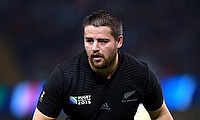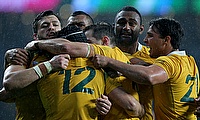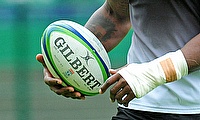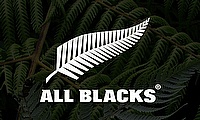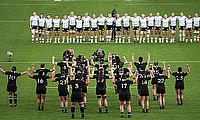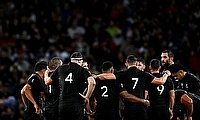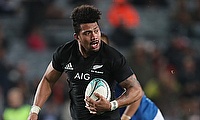Can the Pacific Islands expect more high profile visits?
The world watched last week as the All Blacks made the 2,000 mile journey to Apia, Samoa, where they took part in a historic test against a nation which has had such a prolific bearing on the fortunes of New Zealand rugby.
The occasion and the ceremony of the game was momentous, whilst the game itself was physical, intense and competitive. Though New Zealand escaped Apia Park with a 25-16 victory, they were given a real run for their money by a fired up Samoan side.
The entire world of rugby owes Samoa, as well as the other Pacific Islands, a huge debt, but it was fitting that it was the All Blacks who made the trip. No side has incurred as much interest on that debt over the years as New Zealand.
With the match proving such a success on and off the pitch, the question of whether or not other nations will follow suit and offer their own respects by venturing to the heart of the Pacific Ocean has begun to be asked.
To be blunt, and bearing the hat of pragmatism, there are a myriad of reasons not to, particularly for the nations of the northern hemisphere, as well as the likes of South Africa and Argentina.
With a capacity of just 8,000 for the visit of the All Blacks, Apia Park doesn’t offer touring nations anywhere near the revenue generating potential that a tour to New Zealand or Australia would, and for that reason as much as any, would be unappealing to nations whose financial wellbeing relies on their summer tours.
The financial costs of playing in Samoa, Fiji or Tonga make it all but impossible to sanction a full tour to the Islands, save for the more financially secure unions such as England and France. The knock on effect of this is that teams would only likely be available to play one-off matches in the islands, something which will prove a nightmare to schedule makers.
With domestic competitions in Britain and Ireland running right till the end of May, and the Top 14 in France continuing well into June, chances are that any decision to play a test in Samoa or one of the other islands, before continuing on to New Zealand or Australia, would involve a team shorn of domestic finalists. This was the case for the All Blacks last week, although admittedly with no detraction from the spectacle of the game.
To their credit, the northern hemisphere nations aren’t complete strangers to the islands, with England and Wales both visiting during the amateur era, whilst Scotland are the most recent to visit, having lost 17-16 to Samoa in Apia in 2012.
Unfortunately, however, the two unions most capable of shouldering the financial costs of a tour, England and France, are all but guaranteed an annual spot touring one of South Africa, New Zealand or Australia. Given the relative stature of those three sides in the world game, the argument will always be made by England and France that they are the regular competition their sides need in order to be considered amongst the very best in the world.
Samoa showed against New Zealand, who were admittedly rusty in the first game of their season, that they can be competitive with the best nations in the world, particularly on home soil, but combined with the lack of financial incentive, it does not make the most appealing case to potential suitors. Throw into the mix the emergence of growing rugby nations such as the USA and Japan, who offer big financial potential, and that appeal is unlikely to become any more enticing over the next decade.
However, taking off that hat of pragmatism, we come back to the debt owed to the Pacific Islands. New Zealand may have profited from the trio of Samoa, Fiji and Tonga more so than anyone else, but that doesn’t mean that the likes of England, Australia, France and Wales haven’t been defaulting on their payments, either.
The Aviva Premiership is littered with Polynesian players, whilst Fijian-born Semesa Rokoduguni is currently wearing the white of England in their Rugby World Cup training camp. Samoan-born Manu Tuilagi has also been a significant part of English rugby over the last few years and figures to return to the fold in 2016, when he could be joined by Fijian Nathan Hughes, who is currently uprooting trees for Wasps and has been open about his desire to one day don the Red Rose.
To see Rokoduguni or Hughes running out for England in Suva would be an enthralling spectacle, as would seeing Tuilagi potentially go head-to-head with his brother, Alesana, in Apia. With a three-test series announced with Australia for next summer, there will be scarce time for any such match unfortunately, especially with concerns that many players will be coming to the end of two years non-stop rugby thanks to the Rugby World Cup this year.
As for France and Australia, their debts to the islands, Fiji in particular, are growing. New Zealand have long been considered the biggest reapers of Polynesian rugby, but both the Wallabies and Les Bleus are catching them quickly.
The quartet of Tevita Kuridrani, Samu Kerevi, Henry Speight and Taqele Naiyaravoro, all of whom were picked in Australia’s initial training squad for The Rugby Championship, are Fijian-born and headline a growing group of Polynesian players aiming to represent the Wallabies as their adopted nation. There is similar story in France, where Noa Nakaitaci’s inclusion signals the beginning of an era which could see a very Fijian-flavour to French rugby, thanks to the extensive scouting of Fijian youngsters by Top 14 clubs, as well as the presence of Top 14 academies in the country.
Wales deserve credit for their plans to tour the islands in 2017, but as it coincides with the British and Irish Lions tour of New Zealand, it will likely be a shadow side, much as the one which they sent to Japan in 2013 was. It is hard to imagine Wales sending a full-strength squad to the islands in a non-Lions year.
Could the Lions themselves make a brief stop in Apia or Suva en route to their date with the All Blacks in 2017? Considering the squad could consist of a number of Polynesian players, it would be a fitting prelude to the tour, but as reported by Chris Foy of the Daily Mail, a request from the Fijian Rugby Union has already been turned down by the Lions. Given the 10-match itinerary recently announced for the Lions’ tour of New Zealand, it’s not surprising, especially as the first tour match will take place just a week or two after the Premiership and Pro 12 finals.
The New Zealand Rugby Union can’t be blamed for maximising an opportunity that comes around only once every 12 years, whilst the Lions have the same, agonising wait for their trips to the spiritual home of the sport, but the thought of what a visit from rugby’s most celebrated select side could do for Fijian rugby adds an element of frustration to what should be a fantastic tour.
It’s hard to escape the issues of money in the professional game, but given the wealth of players that the islands deliver not only to domestic competitions around the world, but also to national teams in the southern and northern hemispheres, teams across the globe do need to be more proactive in repaying the islands.
As World Rugby tries to balance growing the game globally with protecting its heartlands, unions such as those in New Zealand, England, Australia and France need to balance their own revenue generating goals with a show of respect and thanks to the nations from which they are happy to take so much.
Encouraging the northern hemisphere nations to play one-off games, on a rotational basis, in the islands en route to their summer tours would be a good start, whilst both England and France, who have the player pools capable of fielding strong second teams, could send teams to Apia, Suva and Nuku’alofa on a more regular basis.
There is no easy solution to this problem, with teams having to willingly give up more profitable opportunities to make the trip, but helping preserve the rugby-playing futures of Samoa, Fiji and Tonga is vital to not only save the soul of rugby, but also to safeguard the sport’s long-term health.

